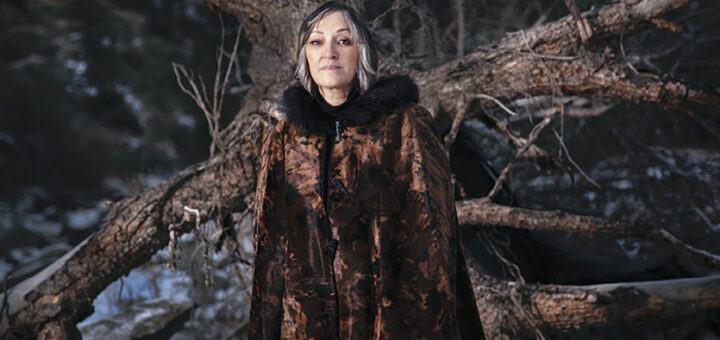Shaping a New Narrative: How One Woman is Redefining Indigenous Reconciliation through Business, Music, and Film

By Emma Marshall, Staff Writer
Through her impactful music and film, Sandra Sutter has become a voice of Indigenous resilience. However, her behind-the-scenes work in the corporate world is laying the foundation for a reality where Indigenous voices are equal and welcomed.
Growing up, Sutter was adopted into a white Christian family, and the truth about her heritage was a mystery to her for most of her life. But deep down, she knew she had Indigenous roots.
“In some ways, I feel that I was robbed of an identity for a period of time,” said Sutter.
Later in life, she discovered that on one side of her family, she is Scottish and Irish, and on the other side, she is Métis – more specifically, Cree with some German. This discovery allowed for Sutter to truly connect with her culture after a lifetime of feeling displaced.
She made a commitment to help heal the world through understanding and kindness. This promise was partially because of the ancestral teachings of a course she was taking through the Indigenous Community-Industry Relations Certificate Program, and also because of her elders, Reg Crow Shoe and Rose Crow Shoe, who told her that she had a duty to her people. Through these experiences, Sutter learned how to implement this responsibility to help the world into her everyday life in the way she knew best.
“Through my music, the message of reconciliation is stronger and more meaningful because it strikes a chord that resonates in the hearts of those who listen,” said Sutter, a well-established award-winning recording artist.
At seven-years-old, Sutter and her siblings all began to take piano lessons. For her, there was an immediate connection to the instrument and to the music. She noted that music is all about love, and that there is beauty in how it can connect people.
“I don’t think that there’s a better way to express what we need to share with the world, and what the world needs to share with us,” said the musician.
In 2017, Sutter went on to record her first full-length studio album with a grant she received from the Alberta Foundation for the Arts. She worked alongside award-winning producers Vince Fontaine and Chris Burke-Gaffney to create her debut album Cluster Stars.
This album conceptualized her vision to bring understanding of Indigenous knowledge and values to both Indigenous and non-Indigenous people, as well as providing peace and acceptance through recognizing the strength of Indigenous nations.
“I can bring awareness to that,” said Sutter. “I can bring healing to myself and others, and I do what I can in part because I have a voice raised in privilege.”
By recognizing the privilege of her upbringing, Sutter is able to use her platform to spread these important messages of healing and peace. She even went on to make a short film, A Woman’s Voice, as a COVID-19 lockdown project, in order to shine a light on challenges that all women face at various points in their lives.
Her hope was to create something meaningful that everyone can relate to. She featured a diverse cast in order to showcase the obstacles of the real world. This film won gold at the New York International Film Festival for the categories of Best Female Filmmaker and Best First Time Filmmaker in 2022.
Sutter knew that through the arts, she was able to reach the largest demographic of people to spread her message. She was also invested in numerous other practices to work towards this cause, including the Circle for Aboriginal Relations (CFAR), a registered non-profit.
During her time at CFAR, she was involved in a pilot project to help improve job opportunities in Indigenous communities.
“The community that Indigenous peoples share is impacted by colonization and by residential schools, and people who’ve experienced that. Continued conflict is happening over hundreds of years, people [who] have experienced trauma react in ways that people who have experienced trauma react — in learned ways,” said Sutter. “It’s also continued by some of the people who went to residential schools, and it’s perpetrated on other students, it’s perpetrated on family members, until someone breaks that cycle.”
It was through this work that Sutter met Rob Hunt, a fellow advocate and developer of Indigenous partnerships. He connected her to a job at PTW Energy, where she still works now, 10 years later, building an ever-growing portfolio of Indigenous partnerships at the company.
This position supports her continued involvement with non-profit organizations and government committees, such as The National Indigenous Economic Development Board and the Métis Women’s Economic Security Council. She works towards achieving equity for Indigenous people across Canada through economic development, and she is a pillar in communications between developmental companies and Indigenous communities.
“We brought an elder in from the local community to ground the project in Indigenous ways of knowing and being before it started,” said Sutter. “He went with one of our project leads to the land near the project, and they did a ceremony on the land. It was that person’s traditional territory. So how does that community feel about that client that we were working for? And about us now? And how do they feel about seeing development on their land in their traditional territory? Now they know they’re a part of it, and they’re helping.”
Using her passion and talent, Sutter has been able to make strides in achieving her dream of reconciliation. She continues to make important connections with the corporate world, the government, and the People. Her devoted work is changing the way that Indigenous people are represented and treated in Canada, and it all comes back to her mission.
“If you think it, if you dream it, you can achieve it.”


